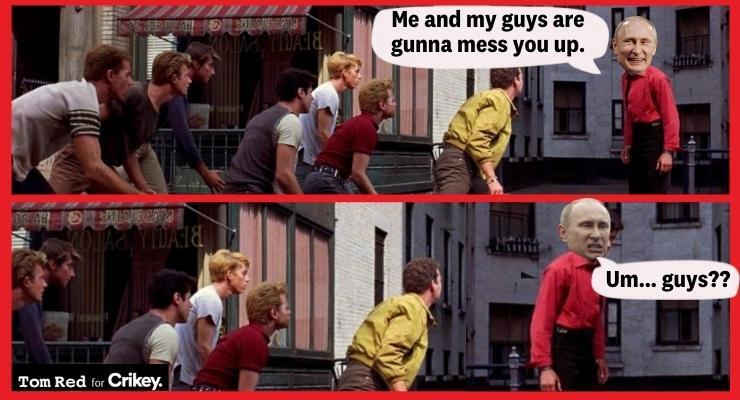
As the UN Security Council meets, the geopolitical reaction to Russia’s invasion of Ukraine is crystallising. Unsurprisingly the US, EU, UK and their allies have rallied behind Ukraine, and the African Union has called for a ceasefire. But a few surprising allegiances have forged on both sides.
Although Russia wasn’t expected to have widespread support, there’s nary an ally in sight as its “48-hour invasion” becomes a drawn-out war. Rather, a series of major players is attempting to both appease Russia and protect their own interests in stability.
Here’s where the world stands:
China
It was less than a month ago that Russian President Vladimir Putin and Chinese President Xi Jinping met in Beijing and talked up their close relationship. But their united front seemingly didn’t involve backing an invasion. China is avoiding getting involved; it abstained from a UN Security council vote to condemn the invasion but also refused to label it as such.
China’s prosperity may be threatened by major economic instability, and hence it has called for “necessary restraint in order to prevent the situation in Ukraine from deteriorating or even getting out of control”.
Israel
Israel is in a similar position. It has strong ties with both the US and Russia. Its foreign ministry initially released a statement that didn’t mention Russia, and referred to the invasion as “steps taken in eastern Ukraine”. It then stepped up the rhetoric, explicitly mentioning “the Russian attack” but retreated to the more neutral language in subsequent statements.
Israel is attempting to play both sides: although it did vote with the US on the UN resolution, it has resisted implementing sanctions.
UAE and India
Also toeing the line are the UAE and India; with China they both abstained from the vote in the Security Council. Although the vote ultimately failed anyway due to Russia’s veto powers, both countries risk upsetting major allies by staying neutral. The UAE is considered a key ally in the Middle East for the US, and India has been enjoying renewed relationships with Australia.
Indonesia
Indonesia also made a middling statement that said a lot about its perspective. It doesn’t mention Russia, and calls on “all parties to cease hostilities”. The Australian Strategic Policy Institute pointed out the significance of the distinction between this statement and Indonesia’s response to AUKUS, which accused Australia of “accelerating” an arms race.
Vietnam
Vietnam has a longstanding connection with Russia dating back to a post-Vietnam War diplomatic alliance, but it is keeping quiet. Its state newspaper was supportive during the annexation of Crimea in 2014, but this time has been reporting both sides of the conflict.
Non-aligned states: Sweden, Finland, Switzerland
The other surprising development is the non-aligned states that have taken a stance for the first time. Sweden and Finland usually avoid taking sides but have joined the efforts to provide weapons to Ukraine. The US is angling for Finland and Sweden to join NATO.
This will be the first time Sweden has sent weapons to another country since 1939 when the Soviet Union invaded neighbouring Finland. It marks a major shift geopolitically; while Finland was pulled into World War II owing to that invasion, Sweden stayed formally neutral for the entire conflict.
The famously neutral Switzerland has also made a historic move to align itself with Ukraine. While it was already formally committed to UN sanctions, it has elected to also join the EU sanctions, signalling a significant shift in its diplomatic stance to international conflict.
Switzerland says it maintains its commitment to neutrality and chose to act only in defence of international law, but the move remains. It has left some channels open, including commodity trading, which is significant given almost 80% of Russia’s commodity trading runs through Swiss financial service centres.
Either way, the major financial institutions based in Switzerland make adopting the significant EU sanctions a major step in the escalating crippling of Russia’s economy.








If there’s any good to come out of this war, perhaps it will be that people finally stop referring to ‘the’ Ukraine.
High price to pay!
Nobody suggested the war was necessary to remove the definite article!
‘U’ & ‘kraine’ means ‘far edge‘ so the definite article seems apposite.
Ah! Far edge of the Russian Empire? Explains a lot!
The far edge; a far edge; our far edge!!
With regard to the relationship between Russia and Vietnam, I visited Nha Trang 3 or 4 years ago and found that in the restaurants and bars, the Vietnamese staff more often than not started speaking to me in Russian when asking for my order. They also spoke good working English but assumed a white face was a Russian. Also of note was the menus were in Russian as well as English and Vietnamese.
In the 60/70s I spent much time (years in toto) in Tito’s Yugoslavia (for the kiddies here, check out his unSoviet regime – hint, it took years for the West to grok!) and found that German was the lingua franca.
Not their preference but quotidian.
I note our prime minister, who is famously unsighted unless billionaires interests are involved, is cynically muttering supportive words for Ukraine and talking tough about standing up to bullies. A bit of pre election PR?
The fake empathy is a bit billious and hard to watch. The fake sincerity isnt much better.
Sweden and Finland have a history of war with Russia
But in peace for 8 decades with Finland and longer with Sweden. Neutrality works.
A much ignored (deliberately and with malice aforethought?) point.
The Gnomes of Zurich STB co-operating in SWIFT finangling – great, I look forward to their unlocking all those numbered accounts of the Grating Good.
Britain would not approve, being the ONLY major/growed-up country that still has jurisdiction over the major tax haven – cf Parliamentary Select Committee reports – the Cayman Islands.
Google if you’ve been asleep for the last century or recently born.
All the neighbours have a history of war with Russia.